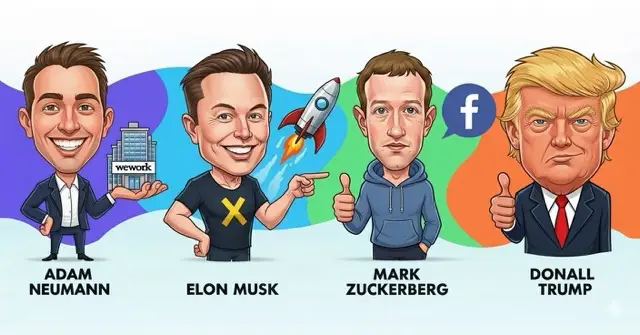If You Want to Be Great in Marketing: You Don't Work 9 to 5
Inspiration: Mark Zuckerberg’s personal branding revamp, Donald Trump’s podcast appearances, and Elon Musk being chronically online.
The title basically says it all.
If you want to be a great marketer, you don’t work a 9-to-5.
In fact, you can’t.
Most jobs can be perfectly executed by sticking to the usual office hours. Salespeople can call their prospects, as the prospects will also be working during those hours. Doctors can see their patients during office hours, as the patients (or, shall we say, customers) have no other choice.
Marketers are required to work past office hours to be great at what they do.
Don’t get me wrong, you can be a good marketer by sticking to the usual 9-to-5. But, I am sorry to share that greatness will require you to push past those hours.
To put it simply, markets don’t stop functioning after your colleagues clock out of their jobs.
Ironically, not to be mixed with the stock market (which basically stops at 4:00 PM), the consumer markets where marketers work ramp up even more once people stop working.
That’s when the working mother goes grocery shopping. The kid starts browsing on Amazon after school. The dad sees an ad about the golf bag on Facebook. These things can happen at any time of the day, but they are more likely to happen after work or school hours.
I assume you are following so far?
Let’s make it a little specific to paint the picture.

Your Brain: On Scan Mode
Do you remember the infamous The Stanley Cup Fire Incident?
Essentially, an unfortunate woman’s car gets destroyed in a fire accident. The Stanley Cup survives, and apparently it EVEN STILL HAD ICE IN IT?!
As you can expect, the video went viral with millions of views.
What happens next is where the marketing magic happens.
Rather than waiting for the next day to assemble in the office, Stanley’s global president Terence Reilly immediately reached out to the woman and offered to replace not only the Stanley, but also her car.
This immediate reaction not only helped Stanley continue the viral moment, but also benefited from it by showing how they are always connected to their customers and behind their products.
Would this happen if the Stanley team chose to clock out after 5? I’m sure you know the answer to that.

There is No OFF Switch
Unlike the previous example (where seeking opportunities after office hours is a choice) this part is most likely not.
Perhaps tied to passion, or how your brain is wired, or both.
Great marketers constantly think of how they can generate ideas to deliver impactful campaigns.
At first, I thought it was purely the creative aspect that required you to do that. Yet, connecting dots is not limited to art. Ideas about data could also be your best friend.
We are not going to dive deeper into how great ideas come to you while taking a shower. That one is given. You have experienced that yourself.
But, in the age of digital and performance marketing, especially with the access to incredible artificial intelligence tools, marketers now constantly create ideas that focus on both the creative (think what you see on an ad, or a video script) and data (which customer cohorts could be matched with the specific creatives).
Hold on… Let’s make this a little less technical. No one likes marketing buzzwords like cohorts and KPIs.
In the earlier years, as marketers did not really have the means to track what worked, data did not play that much of a role in this ideation process.
A creative advertiser thought only of the creative. What to write in the copy, how to position the product, vice versa.
Now, a great marketer is required to do that AND understand the new reality we live in.
Conversion rates. Which customer segments to match with whom. Which ad to show to which persona. What copy to show to which age range.
As ad performance got more ‘trackable’, marketers are now required to connect even more dots.
Good luck trying to do that with an ON/OFF switch.

Public Holidays? Try Again.
Alright, that’s a harsh way to enter this section.
Public holidays (like accountants in the tax season) are where you shine. This is usually where your creative ideas bring the greatest impact. So, it’s not that bad.
But, once again, great marketers do not, and can not take public holidays off.
To make it very simple, marketing is a mix of economics, sociology, and psychology.
Public holidays are when all of these segments not only wake up, but work together in harmony.
Consumerism hopping on roids, if you will…
People are more likely to make purchases individually and collectively (yes, I am looking at you, Christmas gift shopping).
Having more time in hand with being away from work, in a situation where you feel joyful (or the opposite, depending on how you celebrate these days), humans are more likely to purchase that item they saw the other day in an ad – especially now that it is on sale (coincidence, eh?).
That’s why economics, sociology, and psychology work together during these events.
Does psychology stop working after 9 to 5?
It’s an unfortunate reality that ads work better on people when they are happy (celebrating holidays with family) or sad (impulse purchases).
In a good economy, people collectively spend more together. Add consumerism and psychology into the mix, and your job as a marketer gets fairly simpler to execute.
That’s why these days are utilized to deliver the campaigns with most budget – which is why you become even more active than usual workdays.
People have time off, you get overtime.
It is not a coincidence that most of the sales you see are done during holidays – Christmas, Memorial Day, 4th of July, you name it.
Great marketers (especially those who manage the campaigns) stay tuned and watch for potential hiccups, as missing even one day during these events could lead to a significant drop in revenue.
Your purpose as a marketer is to drive revenue. I hope that clarifies how important the scenario is.
Thinking of being off during public holidays? Think again.
Average marketers do. Good marketers can. Great marketers can’t afford to.

Personal Branding? That Only Sleeps When You Do.
People selected for that banner are not picked by accident.
They ARE great marketers.
We now live in an age where the greatest founders, politicians and CEOs are now required to be the greatest marketers through their personal branding.
As they attach their identity to the brands they represent, they practically become the living billboards for their products, collecting BILLIONS of impressions with their moves, actions, and words.
Neumann started a cult-like movement, attracting significant investment for WeWork on his own, despite not having a robust business model to support it.
Mark, with his personal branding after Facebook rebrands to Meta, has also shifted the sentiment around in his benefit (we are talking about someone who was once seen as a geeky figure to now being a cool guy who hangs out with UFC fighters and surfs in a tuxedo while drinking beer to celebrate July 4).
Musk literally did not have to promote Tesla through paid ads, by squeezing his personal branding on all platforms, then acquiring Twitter (now known as X) to amplify his voice – which arguably helped Donald Trump win the presidential election.
Same playbook was followed by Mr. President (I love how Gemini purposefully tweaked the name in that image to be safe), where he -unlike anyone his age- leveraged podcasts with JD Vance, and also created his own social media platform, Truth Social, also to amplify his voice.
If you think these moves are coincidences, think again.
Personal branding is now what drives movements, grows brands, attracts investors (especially retail), and you have to be a great marketer to achieve it.
You probably don’t need me to remind you that Musk does not stick to 9 to 5 while Tweeting. You get the idea.
These figures continue to use marketing in their benefit, and you will see that many other names do the same.
These names are great marketers. You can argue whether they are great CEOs or politicians as much as you wish, but it is undeniable that they marketed their products/brands/political parties perfectly.
Participating in podcasts, attending events, writing books (I am looking at you Brad Jacobs of QXO and Alex Karp of Palantir) … These events do not take place during regular business hours. Because, if you want to be great in marketing, you don’t work 9 to 5.
